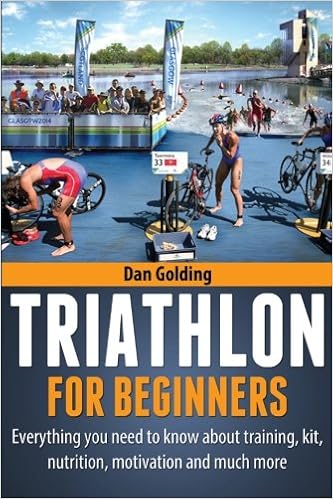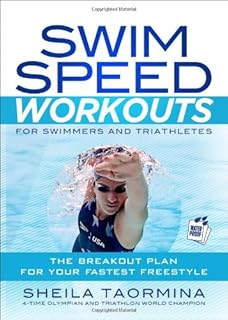 And now for something completely different.
And now for something completely different.
Three years ago I started getting serious about exercise again. It’s been one of the best things I’ve ever done–for stress, for health, for having a hobby, and for just plain feeling better about life. Finding the time (and motivation) is hard for most of us, but I can’t imagine there’s anyone who wouldn’t benefit from including at least a moderate amount of exercise in his (or her) life.
But I’ll save that soapbox for another post. This one is about books. Because what do you do when you try your hand at triathlon? You read books about it! Lots of books. I’m probably better at reading books about swimming, biking, and running than at actually doing those activities. And yet, the books have been helpful. They keep me motivated. They give me new ideas. They provide insight on workouts and technique.
Maybe you’d like to be more active this summer. Maybe the warm weather has you thinking about signing up for a local road race. Maybe you have “triathlon” or “marathon” on your bucket list and want to make those goals a reality. If so, I know some books you might like.
I’ll start with my top five books on swimming, biking, and running. Then I’ll give a brief annotated biography for the rest.
Top Five
 Dan Golding, Triathlon for Beginners: Everything You Need to Know about Training, Kit, Nutrition, Motivation, and Much More (Triathlon Success, 2012). The book has typos and an ugly self-published look to it (on the inside). But it does what it sets out to do. It’s a great book for beginners. I read through it several times before my first race.
Dan Golding, Triathlon for Beginners: Everything You Need to Know about Training, Kit, Nutrition, Motivation, and Much More (Triathlon Success, 2012). The book has typos and an ugly self-published look to it (on the inside). But it does what it sets out to do. It’s a great book for beginners. I read through it several times before my first race.
 Shelia Taormina, Swim Speed Secrets for Swimmers and Triathletes (Velo Press, 2012). I’ve met many people who say, “I’d love to do a triathlon, but I can’t swim.” I had one year of junior high swimming under my belt when I started. It takes a lot of work, but you can teach yourself to swim. I watched hours of videos on YouTube and read this book (and a couple others like it). You’ll learn what you need to know (high elbow catch!) and get plenty of pictures along the way.
Shelia Taormina, Swim Speed Secrets for Swimmers and Triathletes (Velo Press, 2012). I’ve met many people who say, “I’d love to do a triathlon, but I can’t swim.” I had one year of junior high swimming under my belt when I started. It takes a lot of work, but you can teach yourself to swim. I watched hours of videos on YouTube and read this book (and a couple others like it). You’ll learn what you need to know (high elbow catch!) and get plenty of pictures along the way.
 Chris Carmichael and Jim Rutberg, The Time-Crunched Triathlete: Race-Winning Fitness in 8 Hours a Week (Velo Press, 2010). You may be thinking: eight hours is for the time-crunched among us! Yes, that’s a lot of time if you are currently at zero. But many of the triathlon books assume you can put it 12 to 15 hours a week. This is a great book for the person who says, “I’m serious about this hobby, but I don’t want it to take over my life.” Best triathlon training plans of any of these books.
Chris Carmichael and Jim Rutberg, The Time-Crunched Triathlete: Race-Winning Fitness in 8 Hours a Week (Velo Press, 2010). You may be thinking: eight hours is for the time-crunched among us! Yes, that’s a lot of time if you are currently at zero. But many of the triathlon books assume you can put it 12 to 15 hours a week. This is a great book for the person who says, “I’m serious about this hobby, but I don’t want it to take over my life.” Best triathlon training plans of any of these books.
 Bill Pierce, Scott Murr, and Ray Moss, Run Less Run Faster: Become a Faster, Stronger Runner with the Revolutionary 3-Run-a-Week Training Program (Rodale, 2012). Best running book I’ve read, hands down. I’m sure that’s due in part because the training philosophy fits best with my schedule. For my money, this book has the most realistic running plan, the best training program, the best pacing tables, the best stories, and the best FAQs. I’m a big fan.
Bill Pierce, Scott Murr, and Ray Moss, Run Less Run Faster: Become a Faster, Stronger Runner with the Revolutionary 3-Run-a-Week Training Program (Rodale, 2012). Best running book I’ve read, hands down. I’m sure that’s due in part because the training philosophy fits best with my schedule. For my money, this book has the most realistic running plan, the best training program, the best pacing tables, the best stories, and the best FAQs. I’m a big fan.
 Jim Gourley, Faster: Demystifying the Science of Triathlon Speed (Velo Press, 2013). This fascinating book, written by a rocket scientist, explains what actually makes you move faster through water and air. The take away? Don’t spend a fortune on carbon-everything unless you’ve already put in the workouts and lost the pounds.
Jim Gourley, Faster: Demystifying the Science of Triathlon Speed (Velo Press, 2013). This fascinating book, written by a rocket scientist, explains what actually makes you move faster through water and air. The take away? Don’t spend a fortune on carbon-everything unless you’ve already put in the workouts and lost the pounds.
What Else?
Those are good books. But wait, there’s more!
Shelia Taormina’s follow-up book Swim Speed Strokes does for butterfly, backstroke, and breaststroke what the first book did for freestyle. There’s also set of waterproof cards called Swim Speed Workouts. You may also want to check out Swim Workouts for Triathletes and One-Hour Workouts. I’ve used both, though they tend to be too complicated for my tastes.
There are dozens of running books. I enjoyed Matt Fitzgerald’s 80/20 Running, which encourages mostly easy running. Hansons Half Marathon Method is a high-mileage plan, which works for a lot of people but is not my cup of tea. Brad Hudson’s book Run Faster from the 5k to the Marathon is a useful one-stop guide, although the print is too small.
I really enjoyed The Well-Built Triathlete by Matt Dixon. It was one of the first books I read. Lots of helpful stuff, even for beginners (although he’s geared more for Ironman athletes putting in more than 12 hours a week). The Triathlete Training Bible (3rd Edition) by Joe Friel may be the most popular one in the field. It’s also big and long. It’s probably just me, but I found Triathlete Magazine’s Essential Week-by-Week Training Guide completely overwhelming. I looked at the training plans and couldn’t make sense of them.
Another great book for beginners is The Triathlon Training Book by DK with an attractive, easy-to-use magazine-type format. Triathlon Anatomy has terrific drawings with practical strength-training suggestions. I loved the first half of Jim Vance’s Triathlon 2.0, but the second half, with lots of graphs and equations, went over my head.
If you want to bump up from Sprint or Olympic distance to Half Ironman or Ironman, check out Dan Golden’s Triathlon Winning at 70.3 and Don Fink’s Be Iron Fit. I haven’t yet done the longer distances, but if I do I’ll come back to Fink’s book.
Want a book that focuses on stories instead of technique, technology, and training plans? Read How Bad Do You Want It? by Matt Fitzgerald, who examines the psychobiological factors in athletic performance.


















